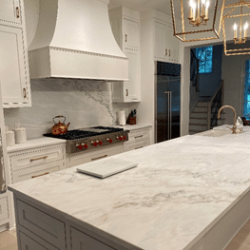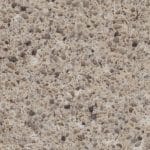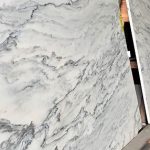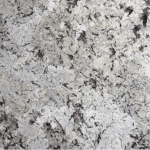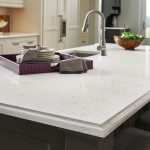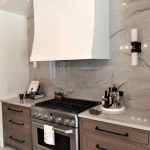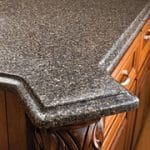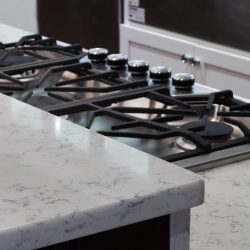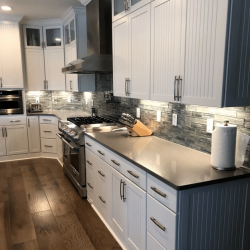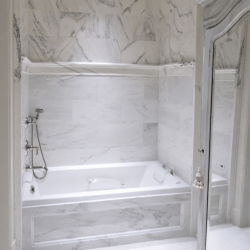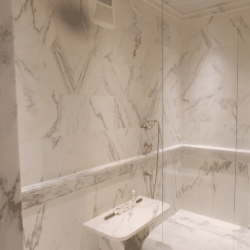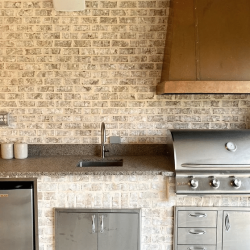If you’re researching new countertops for the first time, you’re probably feeling a little overwhelmed. While there are many options to choose from (let’s not forget about marble, quartzite, and solid surface), many people who want a long-lasting, low maintenance material for their kitchen or bathroom end up narrowing their primary choices down to granite or quartz.
Here, we compare these two popular materials based on the three main factors most home owners consider: durability, appearance, and cost.
What are the major differences between granite and quartz?
Let’s start off with some basics. The big difference between granite and quartz is that granite is 100% natural and contains no man-made materials or resins. Quartz, on the other hand, is an engineered stone: a certain percent of any quartz slab is binding resins. Both materials are safe, durable, and easy to maintain for indoor spaces. If you’re planning for an outdoor kitchen you can stop reading here, because we only recommend granite for outdoor use. The pigments in quartz can fade when directly exposed to UV rays over a long period of time.
We should also clarify that engineered quartz should not be confused with Corian, which is a solid surface material. While quartz is technically an engineered product, it is made up of 93% quartz, making it much harder than solid surface. This also explains why quartz requires different fabrication equipment than Corian does.
-
Durability
Both granite (as long as it’s sealed) and quartz are incredibly durable. However, granite is much more heat resistant than quartz is. Granite can be exposed to up to 1,200 degrees, while quartz can only withstand up to 350 degrees. For both materials (and especially with quartz), we recommend using a trivet under any hot pans to be safe.
Granite is naturally porous (that’s why it should be periodically re-sealed). This means granite is more susceptible to staining than quartz, which is non-porous. If you choose granite, you’ll want to make sure you clean up spills as soon as they happen. Otherwise, both materials are relatively low maintenance.
Granite is highly scratch-resistant, but can be susceptible to chipping on impact. Quartz, on the other hand, is more vulnerable to scratches, but less likely to chip. As long as you take normal precautions (always use a cutting board, especially with quartz; and don’t plan to do any carpentry projects on the kitchen counter), you should be fine with either option.
Both quartz and granite are considered to be very durable relative to other surface materials, and perfectly effective for any active kitchen.
-
Appearance
Because granite is a product of nature, every slab is unique. It was a part of the earth for thousands of years, and its beauty is impossible to replicate in man-made materials. For many, this is an appealing aspect that tips the scales in favor of granite.
However, there are also aesthetic benefits of man-made materials. Quartz is more likely to have even texture throughout the slab. For someone who doesn’t like a lot of variation in their stone, this may be a deciding factor. It could also be easier for your fabrication shop to match veins across multiple slabs of quartz thanks to its consistent coloration.

Cafe Latte Granite

Canterbury Quartz by Cambria
-
Cost
If you’re on a budget, low-level granites are less expensive than the lowest cost quartz (“low level” refers to the color, not the integrity or durability of the stone). Once you get into mid- and upper-range colors, the cost for purchasing, fabricating, and installing quartz and granite is approximately the same. In both categories, you can find a wide range of material costs.
The size of your project, edge profiles, and other factors can impact the price significantly, so it’s best to partner with a trusted stone fabricator like Stone Interiors early in the process. A stone professional can guide you through the process of picking your ideal material and setting a realistic budget.
Investing in a new stone countertop, table top, or kitchen island is a major home improvement project. It’s easy to get caught up in the various pros and cons of every material type. If you’re at a loss, visit a fabrication shop and ask if you can test out a few different samples. This allows you to see how they’ll look in your space, and even test firsthand how easy they are to clean.
Regardless of whether you choose granite or quartz, we wish you luck in the process of renovating your kitchen!

Viatera Quartz Countertop by Stone Interiors

Colonial Gold Granite Countertop by Stone Interiors





